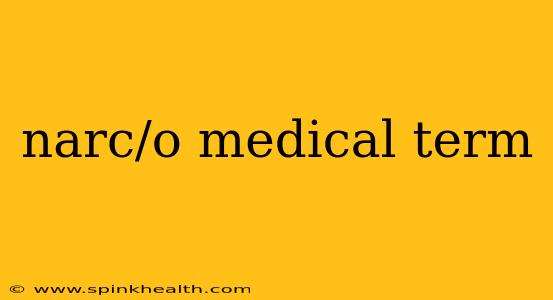The term "narc-" or "narco-" might sound ominous, conjuring images of illegal substances. However, in the medical world, "narco-" has a much older and more nuanced meaning, rooted in its Greek origins. It doesn't inherently signify illegality, but rather points to a specific effect on the body: stupor or numbness. Let's delve into the fascinating history and current usage of this medical prefix.
What Does Narco- Mean in Medical Terms?
The prefix "narco-" comes from the Greek word "narke," meaning "numbness" or "torpor." This original meaning helps us understand its application in various medical terms. It primarily refers to substances that induce a state of drowsiness, sleepiness, or even unconsciousness. While many narcotics today are controlled substances due to their potential for abuse and addiction, the term itself is neutral and simply describes the pharmacological effect.
Think of it like this: a sleeping pill might be described as having "narcotic effects," meaning it induces sleep and reduces awareness. This doesn't automatically equate it to an illegal drug. The key difference lies in whether the substance is controlled and regulated.
What are Narcotics? Are they all illegal?
This is a common misconception. While many narcotics are indeed controlled substances due to their high potential for addiction (opioids, for instance), the term "narcotic" doesn't automatically imply illegality. The classification depends on legal regulations, not the inherent properties of the substance itself. Historically, many medicinal substances with narcotic properties (inducing sleep or numbness) were used before strict controls were established. These included naturally occurring compounds derived from plants like opium poppies.
Many modern medications, while possessing narcotic properties, are tightly regulated and only available through prescription. These are used for legitimate pain management, anesthesia, or other medical needs.
Are there any examples of medical terms starting with narco-?
Absolutely! Here are a few examples to illustrate the use of the "narco-" prefix in various medical contexts:
-
Narcotic analgesics: These are pain relievers that have narcotic properties, meaning they induce drowsiness and alleviate pain simultaneously. Many opioid-based pain medications fall into this category.
-
Narcolepsy: This neurological disorder is characterized by an overwhelming need to sleep at inappropriate times, indicating a disruption in the body's natural sleep-wake cycle. The "narco-" prefix here reflects the debilitating sleepiness experienced by those with narcolepsy.
-
Narcoanalysis: This is a now-largely obsolete psychiatric technique that involved using narcotics to help patients access repressed memories or emotions. Its use is controversial due to ethical concerns and the potential for unreliable information.
What are some commonly asked questions about "narco-"?
Here are answers to some frequently asked questions about this prefix:
What is the difference between narcotics and opioids?
While all opioids are narcotics, not all narcotics are opioids. Opioids are a specific class of narcotics derived from the opium poppy or synthetically created to mimic its effects. Narcotics encompass a broader range of substances that induce sleepiness or numbness, including some that aren't opioids.
Are all narcotics addictive?
Many narcotics have a high potential for addiction, but not all. The risk of addiction varies greatly depending on the specific substance and individual factors.
Are there any non-addictive narcotics?
Some substances with mild narcotic effects might have a lower risk of addiction, but it's crucial to remember that even seemingly harmless substances can be addictive if misused.
What are the side effects of narcotics?
Side effects can range from drowsiness and nausea to more severe complications like respiratory depression and addiction, depending on the specific drug and the dosage.
In conclusion, the medical term "narco-" simply points to the property of inducing stupor or numbness. While many substances with this property are controlled due to their potential for abuse, the prefix itself doesn't inherently indicate illegality. Understanding its historical context and current applications is crucial for navigating medical terminology and dispelling common misconceptions surrounding narcotics.

